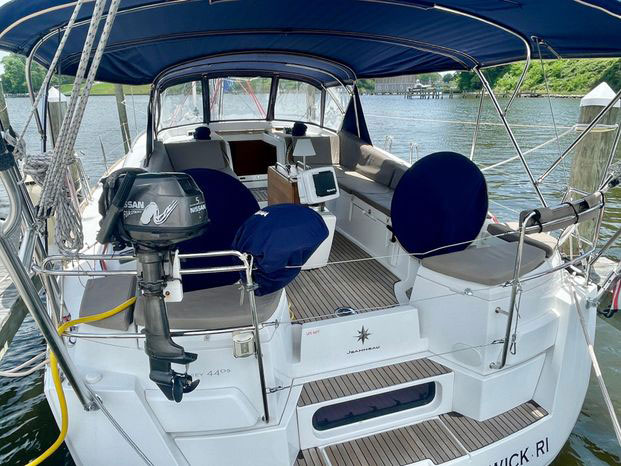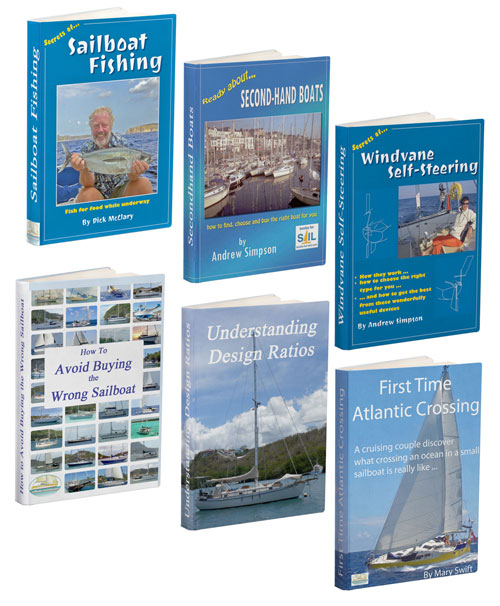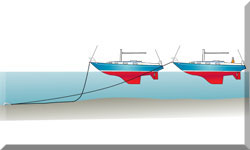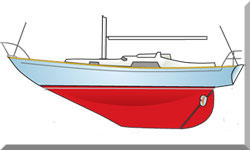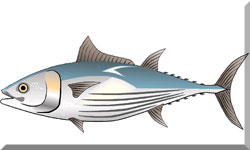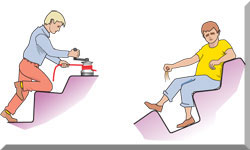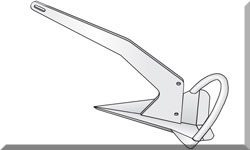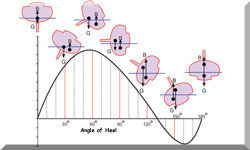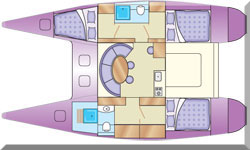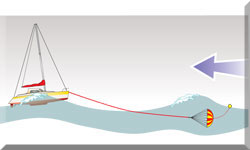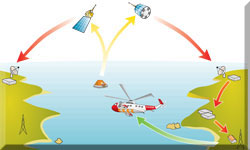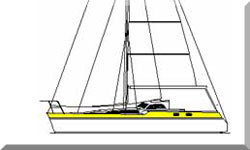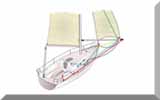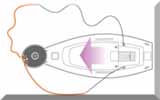- Home
- Cruising Boats
- Sailboat Cockpit
What makes for an
Efficient Sailboat Cockpit?
Perhaps because sailboat cockpit design doesn't present the same marketing opportunities as the living space below it, it's not unusual to find that cockpit layouts have been compromised in favour of a commodious aft-cabin.
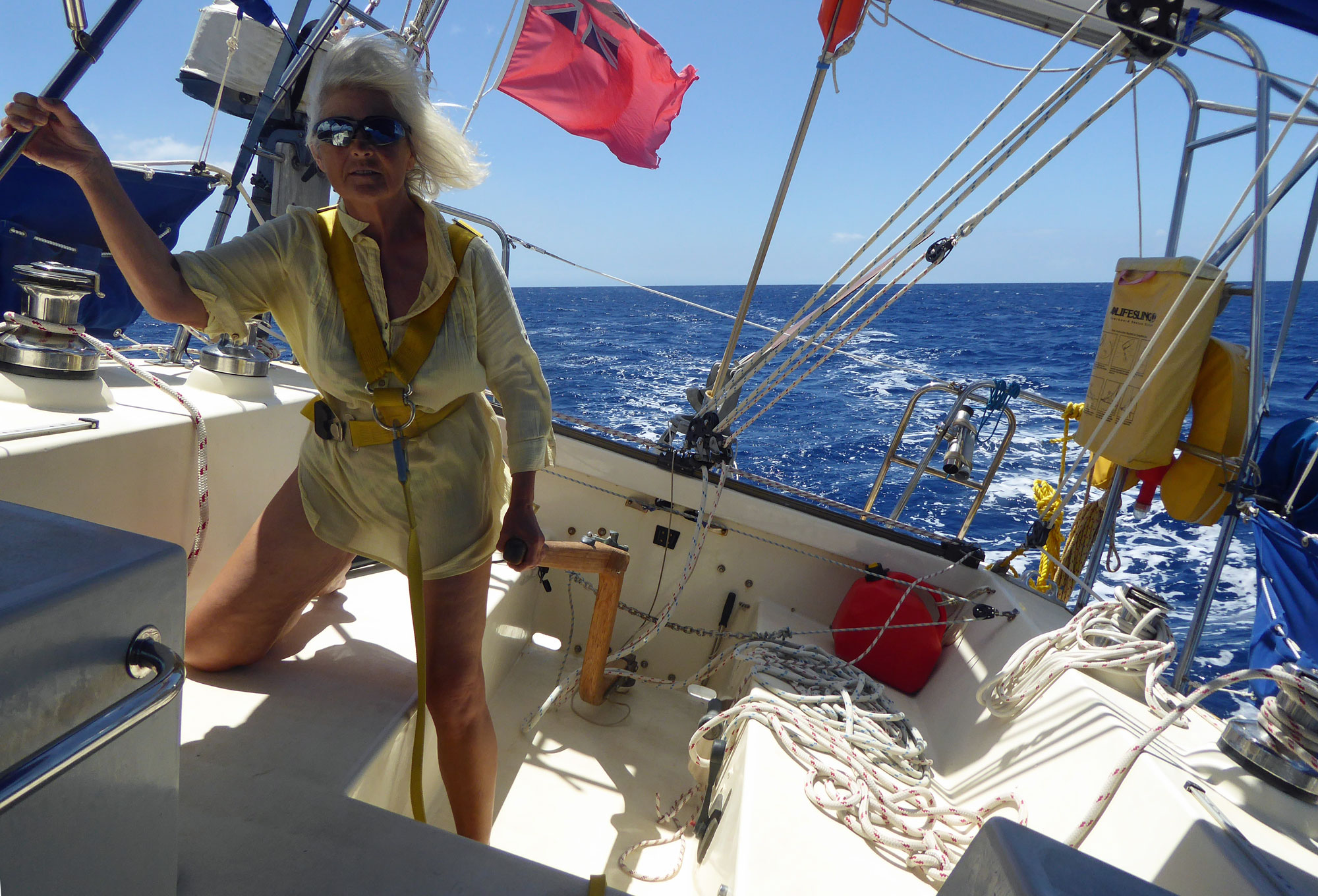 Form follows function on this practical aft-cockpit design
Form follows function on this practical aft-cockpit designThis is borne out by a number of modestly sized boats that accept the disadvantages of a centre-cockpit in favour of a veritable bedroom in the stern where the cockpit should rightly be.
Underway, the cockpit is the centre of activity. Helming, watchkeeping, sail trimming or just plain relaxing - it's all done from here.
Sheets, cleats and jammers should fall readily to hand, and winch handles must be able to operate 'full circle'.
Properly thought out, it will be a satisfying and safe place to be - efficient for sailors and comfortable for our guests.
Keeping the Helmsman & Sheet Handlers Happy
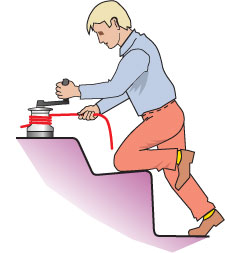 An ideal winching position
An ideal winching positionForemost in the cockpit designer's mind should be the requirements of the helmsman and the sheet handlers.
For a wheel-steered yacht a 'T' shaped cockpit is often the preferred solution, giving the otherwise trapped helmsman room to move around the wheel into the main part of the cockpit.
The cockpit seats of a tiller-steered yacht must accommodate the sweep of the tiller without interference, and the tiller itself should be of a height and shape to avoid the knees of a sitting helmsman.
Cockpit Biminis & Enclosures
Cockpit occupants won't appreciate being burned to a crisp - they'll need both shade and protection from the sun's harmful ultra-violet (UV) rays, provided either by a cockpit bimini or a full cockpit enclosure.
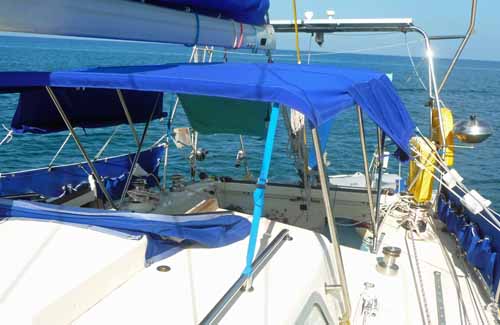 A simple bimini with roll-down side screens.
A simple bimini with roll-down side screens.Cockpit Biminis
A cockpit Bimini in it's basic form is a framework with a canvas or fabric top that provides shade and protection from the sun, which can be folded away when not not needed. Some will have side screens which can be rolled down to provide shade when the boat is heeled to windward.
Cockpit Enclosures
A full cockpit enclosure is a more comprehensive structure that provides protection from wind, rain, and spray. It usually consists of a framework with fabric panels that can be zipped or rolled up.
They offer excellent protection from rain, wind, and spray and create an additional covered area that can be used for socializing, storage, or even as an extra sleeping space. However they can't be removed in a hurry and in extreme conditions their substantial windage could be an issue. And in my opinion, they do nothing to enhance the appearance of a sailboat!
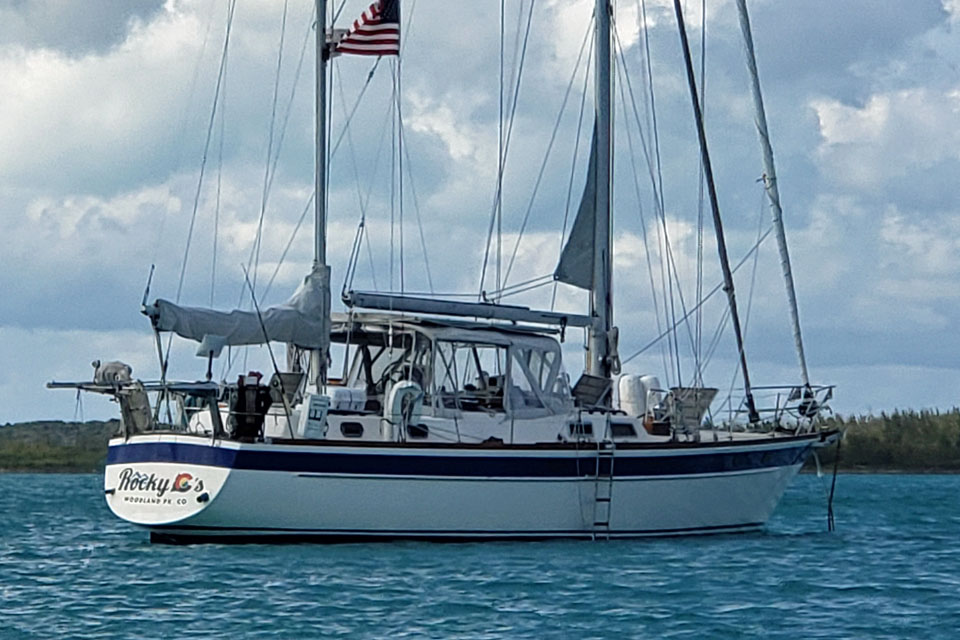 This Pearson 530 sports a full cockpit enclosure.
This Pearson 530 sports a full cockpit enclosure.
Sailboat Cockpit Ergonomics and Dimensions
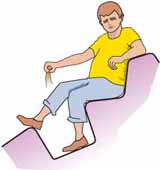 Are you sitting comfortably?
Are you sitting comfortably?It's not enough for the cockpit to be secure; it must also feel secure. But it won't if the sensation is of being perched upon on it rather than being in it.
Security is largely a function of the depth of the cockpit, over which other factors have a controlling influence:
- At extreme angles of heel the leeward edge of the sole must remain above the waterline level to enable it to drain;
- The cockpit sole should not be so deep such that it is impossible to see over the coachroof when standing up;
- Although the dimensions of the human body determine the height of the seat above the sole, usually 375mm to 500mm, ideally you'll also be able to see over the coachroof when sitting down.
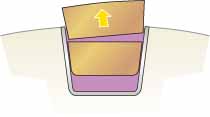 Moderately angled sides like this one are safer
Moderately angled sides like this one are saferOther features to be found in a good, sea-going sail boat cockpit layout include:
- Seatbacks that are at least 350mm high and angled such that you can remain sitting upright on the windward side when the boat is heeled;
- Seats wide enough, around 500mm, to provide adequate support under the thighs;
- Seats that are parallel and close enough together to enable seated occupants on the windward side to comfortably brace their feet against the leeward seats when heeled;
- Moderate volume and adequate drainage. For an aft-cockpit boat, the most efficient drainage is through the transom. A couple of 50mm diameter holes here will drain a moderately sized sailboat cockpit inside two minutes;
- A bridgedeck to at least the height of the seats, which not only reduces the volume of the cockpit well but also provides a step-up to the companionway sill;
- The companionway sill should be at least as high as the coaming, thereby preventing a cockpit full of water from finding its way below;
- A main hatch, preferably on the centreline, with moderately angled sides. Washboards in a heavily vee'd hatch only have to float up a short distance before they fall out.
Artwork by Andrew Simpson
A Cockpit Table?
Fixed cockpit tables aren't likely to be found on smaller tiller-steered vessels for obvious reasons, but often have a removable folding table stowed below for use at anchor or in harbour.
Many sailboats with wheel steering have a fixed table attached to the pedestal as shown here, but my preference is to keep the cockpit clear when underway, and have a table that folds down against the pedestal.
Read here the argument for where the sailboat cockpit is best placed - centre or aft?
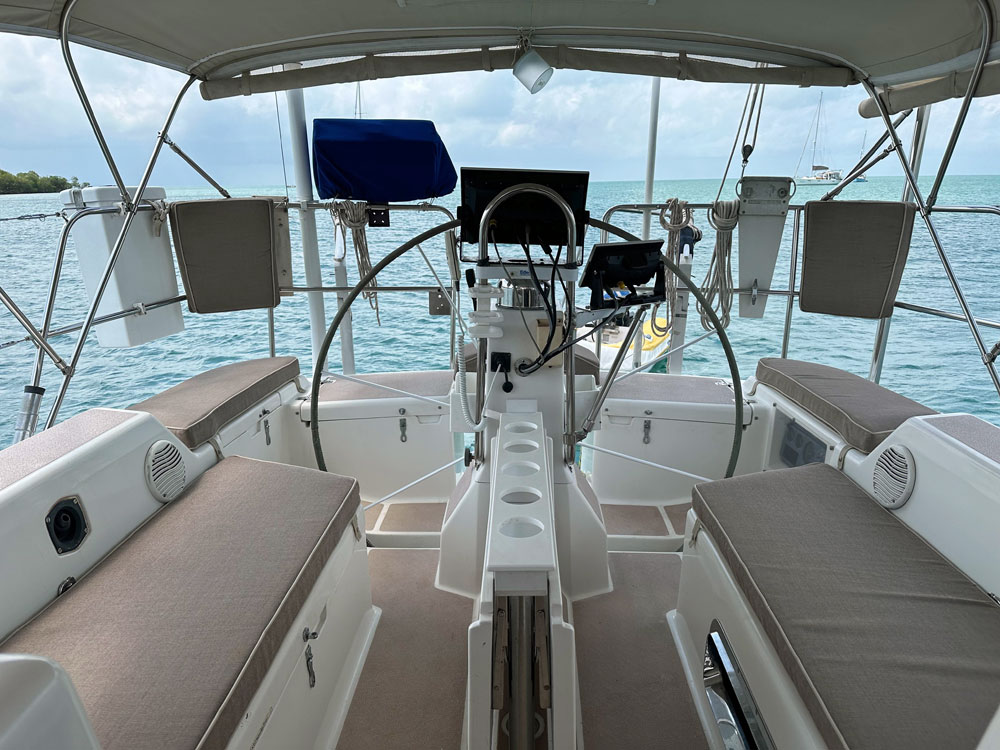 It's important that the leaves of the cockpit table can be folded away and secured when underway, as on this Freedom 40
It's important that the leaves of the cockpit table can be folded away and secured when underway, as on this Freedom 40Summing up...
When evaluating a sailboat cockpit, there are several key features and factors to consider:
- Layout: There should be ample space to move around comfortably and easily access all controls.
- Seating: Look for ergonomically designed seating that offers comfort for long periods.
- Visibility: Check for unobstructed views from the helm, both forward and to the sides.
- Control Access: Make sure the primary controls (sheet winches, reefing lines and throttle) are within easy reach from the helm.
- Storage: Adequate storage compartments for safety gear, personal items, and other essentials.
- Shelter: A Bimini or dodger for protection against the elements can be a valuable addition.
- Safety: Non-slip surfaces are a must, as are well-placed handholds and secure lifelines.
- Drainage: Good drainage is crucial to prevent water accumulation in the cockpit area.
Recent Articles
-
Small Boat Radar Systems: Your Questions Answered
Apr 13, 25 06:40 AM
Whatever your question about small boat radar systems, you're very likely to find the answers here... -
How a Marine EPIRB Can Get You into Trouble, As Well As Out Of It
Apr 12, 25 05:51 PM
Activating a marine EPIRB or a Personal Locator Beacon (PLB) when you're not in distress can get you in big trouble with the Coastguard, as this cautionary tale relates. -
What is an EPIRB?
Apr 12, 25 05:43 PM
Got any EPIRB-related questions? You're almost certain to find the answers here...
